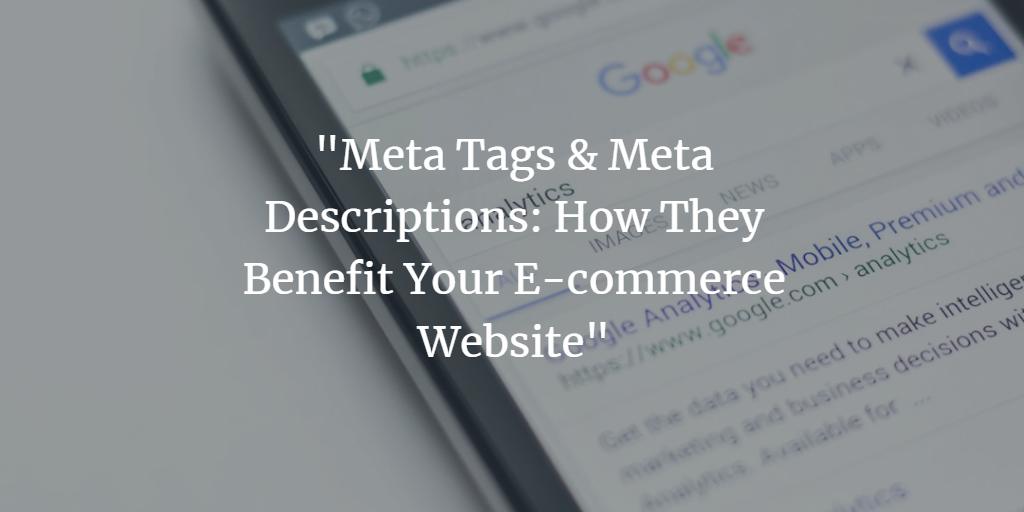Meta Tags & Meta Descriptions: How They Benefit Your E-commerce Website

If you're starting your online e-commerce website, it's important to have a solid understanding of search engine optimization (SEO) and the various strategies and techniques you can use to improve the visibility and credibility of your site. One aspect of SEO that is often overlooked by website owners is the use of meta tags and meta descriptions. In this article, we'll delve into what these are, how they work, and how you can use them to benefit your e-commerce website.
What Are Meta Tags?
Meta tags are snippets of code that are placed in the HTML of a web page. They provide information about the page, such as its title, subject matter, and the language the page is written in. Meta tags are not visible to users when they visit a web page, but they are read by search engines and can impact how the page is indexed and ranked in search results.
There are many different types of meta tags, including:
Title tags: These are the most important meta tags, as they provide the title of the page and are displayed in the search results as the main link. It's important to use a descriptive and concise title that accurately reflects the content of the page and incorporates relevant keywords.
Meta descriptions: These tags provide a brief summary of the content on a web page and are often displayed in the search results below the title tag. Meta descriptions should be written in clear and compelling language that accurately reflects the content of the page and incorporates relevant keywords.
Meta keywords: These tags are a list of keywords that are relevant to the content of the page. While meta keywords were once used by search engines to help determine the relevance of a page, they are now largely ignored as they were often abused by website owners to stuff their pages with irrelevant keywords to improve their ranking.
Meta robots: These tags are used to instruct search engines on how to crawl and index a web page. For example, you can use the "no-index" tag to tell search engines not to index a particular page, or the "no-follow" tag to tell them not to follow any links on the page.
Meta refresh: These tags are used to redirect users to a different page after a specified period.
What Are Meta Descriptions and How Do They Benefit Your E-commerce Website?
Meta descriptions are a type of meta tag that provide a summary of the content on a web page. They are often displayed in the search results of search engines like Google and can help to give users an idea of what the page is about before they click on the link. With the description being displayed as a summary, it is advised that these descriptions are clear, concise, and limited to 155 characters.
While meta descriptions do not directly impact a page's ranking in search results, they can still be an important factor in attracting clicks and traffic to your website. By writing effective meta descriptions that accurately reflect the content of the page and incorporate relevant keywords, you can entice users to click on your link and visit your website.
How Can You Use Meta Tags and Meta Descriptions to Benefit Your E-commerce Website?
Now that you have a better understanding of what meta tags and meta descriptions are and how they work, here are a few tips on how you can use them to benefit your e-commerce website:
Use descriptive and compelling language: The goal of your meta tags and descriptions should be to accurately reflect the content of the page and entice users to click on your link. Avoid using vague or misleading language and focus on using clear and concise language that accurately describes what users can expect to find on your page.
Incorporate relevant keywords: Keywords are an important part of SEO and incorporating relevant keywords into your meta tags and descriptions can help to improve your website's ranking in search results. However, it's important to avoid keyword stuffing, as this can harm your ranking and make your content appear spammy.
Make sure your meta tags and descriptions are unique: Each page on your website should have its own unique meta tags and descriptions. Copying and pasting the same tags and descriptions across multiple pages can lead to confusion for users and search engines and can harm your ranking.
Keep your meta tags and descriptions up to date: As you add new content to your website or make changes to existing pages, be sure to update your meta tags and descriptions to accurately reflect the new content. This will help to ensure that your website is being properly indexed and ranked by search engines.
Use meta tags and descriptions as part of a comprehensive SEO strategy: Meta tags and descriptions are just one aspect of SEO, and it's important to consider them in the context of a comprehensive strategy. Other factors that can impact your ranking in search results include the quality and relevance of your content, the structure and organization of your website, and the number and quality of links pointing to your site.
In conclusion, meta tags and meta descriptions are an important part of SEO for your e-commerce website. By using descriptive and compelling language, incorporating relevant keywords, and keeping your tags and descriptions up to date, you can improve the visibility and credibility of your website and drive more traffic and potential sales. Remember to consider meta tags and descriptions as part of a comprehensive SEO strategy, and don't hesitate to seek out additional resources or expert advice if you have any questions.


